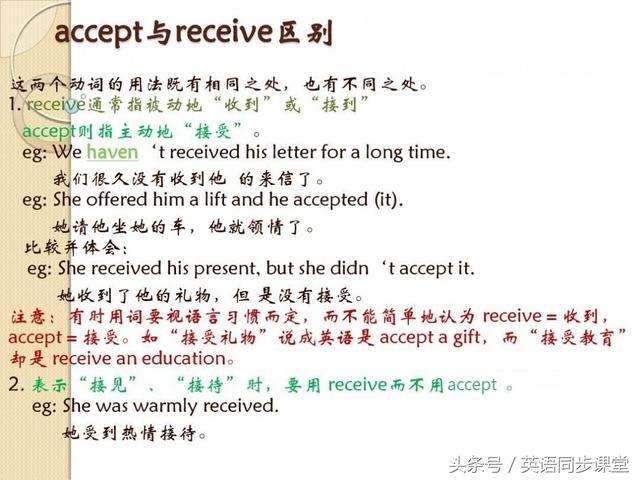八年级英语九单元知识点(八年级英语下知识点与考点解析:unit9)
Unit 9 Can you come to my party?
短语归纳:
on Saturday afternoon在周六下午 come to the party来参加聚会 prepare for…为…做准备
go to a/the doctor去看医生 have the flu患感冒 help my parents帮助我的父母
meet my friend会见我的朋友 another time其他时间 last fall去年秋天
go to the party去聚会 hang out常去某处;泡在某处 the day after tomorrow后天
the day before yesterday前天 study for a test复习备考 look after照看;照顾
accept an invitaton接受邀请 turn down an invitation拒绝邀请 take a trip去旅行
at the end of this month这个月末 help out withsth.帮助分担/解决难题 by now 到现在为止
look forward to盼望;期待 the opening of… …的开幕式/落成典礼 hear from sb. 收到某人来信
housewarming party乔迁聚会 reply in writing书面回复 go to the/a concert去听音乐会
reply to sth./sb.答复某事/某人 have a surprise party for sb.为某人举办一个惊喜派对
句式与结构:
I’m sorry, I’m not available.抱歉,我没有空. not…until....直到……才
I’d love to,but I’m afraid I can’t.我想去但我不能去 invite sb. to do sth.邀请某人做某事
What a/an adj. 可数名词单数( 主语 谓语)! help sb.(to)do sth.帮助某人做某事
What adj. 名词复数/不可数名词( 主语 谓语)! be sad to do sth.做某事很悲伤
see sb. do sth.看见做 see sb.doing sth. 看见正做 look forward to doing sth.期盼做某事
What’s today? 今天是什么日子? What’s the date today? What day is it today?

语法详解:
1.prepare:意为“准备”,强调准备的动作与过程。宾语是这一动作的承受者。其后也可接双宾语,还可接不定式。
Prepare sth.准备… Our English teacher was preparing the lessons我们英语老师在备课.
prepare sb. sth.=prepare sth. for sb. 为某人准备某物 She prepared us a nice breakfast. =She prepared a nice breakfast for us. 她给我们准备了可口的早餐。
Prepare to do sth. They are preparing to cross the river when it begins to rain.他们正准备过河,突然下雨了
prepare for sth. 为…准备好。for的宾语不是动作的承受者,而是表示准备的目的,即所要应付的情况。 The students are busy preparing for the final exam.学生们正在准备期末考试。
另: get/be ready意为“准备好”,强调准备的结果。常见结构有:①be ready(for sth.)②get sth. ready ③be ready(for sth)④be get ready to do(准备干某事,乐于干某事)
We _____ the mid-term examination. Miss Li said, “Everyone should ______before class.
2. have the flu 患感冒, have a cold 感冒 ,have a cough 咳嗽, have a fever 发烧 , have a sore throat 喉咙痛, have a headache 头痛 ,have a toothache 牙痛,have a sore back背疼
3. hang out 常去某处,泡在某处,
hang on 紧紧抓住,
hang about 闲荡,
hang up 挂电话,悬挂,挂起
3. catch you =see you = bye bye ,
catch a cold感冒 ,
catch sb’s eye引起某人注意,
catch the train 赶上火车
catch up with =keep up with 赶上,跟上 ,
catch hold of=take hold of 抓住
4. accept 接受 , 反义词为: refuse。 accept指主观上愿意接受,
receive 收到,指客观上收到或拿到,但主观上不一定会接受。
I received his gift yesterday, but I wouldn’t like to accept it.

5. help sb.(to) do sth 帮助某人做某事
help sb. with sth 在某方面帮助人
help oneself to sth 随便吃
help out帮助解决(难题等)
6. at the end of 在…末尾,在…尽头 by the end of 到…末为止 in the end of 终于
7. surprised 形容词,感到意外的,主语是人be surprised to do sth 对做某事感到意外
surprising 形容词,令人惊讶的,主语是物 These days the news about vaccine safety(疫苗安全问题) was really surpring.
surprise 名词,惊奇、惊讶 to one’s surprise使某人吃惊,动词,使惊奇,使感到意外
It surprise sb to do sth. It surprised me to see her again for so long.
8. look forward to 期待,盼望,to 是介词,后跟名词,代词或动名词作宾语。
hear from sb. 收到某人的来信 = receive a letter from sb. hear of = hear about 听说
9. make it①在约定的时间内到达,能够来 = arrive in time; Glad you could make it.
②商量确定的时间,表示将来某项计划的安排,后接时间状语。Let’s make it at seven o’clock on Tuesday.③成功办成某事 = succeed . After years of hard work, he finally made it.
10. Reply:①(vt.)回答,指用口头或书面形式回答, reply to sb/sth. 对…..作出回答。
②(vi.)意为 回答,回答说。”I’m ok”,he replys with a smile.
answer包括口头,书面或行动的回答,可作及物和不及物动词。
He answered my letter. 他给我回了信。(指他在信中说信已收到等)
He replied to my letter. 他给我回了信。(指他在信中把我提出的问题都作出回答)
answer还可表示接听(电话)或对门铃等声响作出反应等(常与 telephone, door, bell, door-bell 等连用)。但 reply 不能这样用。如:
Who answered the telephone? 谁接的电话?
A little girl answered the door. 一个小女孩应声去开门
两者除用作动词外,都可用作名词。要表示“对……的回答(答复,答案)”等,其后均接介词 to (不用 of)。如:Have you had an answer to your letter? 你寄出的信有回音没有?
I received no reply to my request. 我的要求没有收到任何答复。

11. Not…until…直到…才…口语中可用till代替until,如:
Don’t leave today’s work till tomorrow.
I didn’t go to bed last night until past midnight.
13. without (介词)没有 名/代/V-ing. 反:with“具有”
We can’t live without water.
Jane is a beautiful girl with long hair.
14. so that 从句: 以便于;目的是
I study hard so that I can get good grades.
区别于:she always works so hard that she gets good grades finally.(结果)
15. 表示”邀请”的句型:
Can (could) you …? Can you come to my party tonight?
Let’s… let’s go to the movies tomorrow night.
Do you want to…? Do you want to go shopping with next week?
Would you like to…? Would you like to come to my housewarming party?
May I ask you to…? May I ask you to have dinner with me?
回答通常有: 接受: Sure/Yes/Of course, I’d love/like to.
拒绝:Sure, I’d love to./Sorry, I can’t.
Sorry, I’m afraid not/ I can’t.
I‘d love to. But I must/have to …
I’m sorry, I’m not available.
,免责声明:本文仅代表文章作者的个人观点,与本站无关。其原创性、真实性以及文中陈述文字和内容未经本站证实,对本文以及其中全部或者部分内容文字的真实性、完整性和原创性本站不作任何保证或承诺,请读者仅作参考,并自行核实相关内容。文章投诉邮箱:anhduc.ph@yahoo.com






